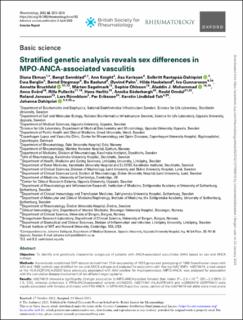Stratified genetic analysis reveals sex differences in MPO-ANCA-associated vasculitis
Ekman, Diana; Sennblad, Bengt; Knight, Ann; Karlsson, Åsa; Rantapää-Dahlqvist, Solbritt; Berglin, Ewa; Stegmayr, Bernd; Baslund, Bo; Palm, Øyvind; Haukeland, Hilde; Gunnarsson, Iva; Bruchfeld, Annette; Segelmark, Mårten; Ohlsson, Sophie; Mohammad, Aladdin J; Svärd, Anna; Pullerits, Rille; Herlitz, Hans; Söderbergh, Annika; Omdal, Roald; Jonsson, Roland; Rönnblom, Lars; Eriksson, Per; Lindblad-Toh, Kerstin; Dahlqvist, Johanna
Journal article, Peer reviewed
Published version

Åpne
Permanent lenke
https://hdl.handle.net/11250/3125292Utgivelsesdato
2023Metadata
Vis full innførselSamlinger
- Department of Clinical Science [2318]
- Registrations from Cristin [9791]
Sammendrag
Objective
To identify and genetically characterize subgroups of patients with ANCA-associated vasculitides (AAV) based on sex and ANCA subtype.
Methods
A previously established SNP dataset derived from DNA sequencing of 1853 genes and genotyping of 1088 Scandinavian cases with AAV and 1589 controls was stratified for sex and ANCA subtype and analysed for association with five top AAV SNPs. rs9274619, a lead variant at the HLA-DQB1/HLA-DQA2 locus previously associated with AAV positive for myeloperoxidase (MPO)-ANCA, was analysed for association with the cumulative disease involvement of ten different organ systems.
Results
rs9274619 showed a significantly stronger association to MPO-ANCA-positive females than males [P = 2.0 × 10−4, OR = 2.3 (95% CI 1.5, 3.5)], whereas proteinase 3 (PR3)-ANCA-associated variants rs1042335, rs9277341 (HLA-DPB1/A1) and rs28929474 (SERPINA1) were equally associated with females and males with PR3-ANCA. In MPO-ANCA-positive cases, carriers of the rs9274619 risk allele were more prone to disease engagement of eyes [P = 0.021, OR = 11 (95% CI 2.2, 205)] but less prone to pulmonary involvement [P = 0.026, OR = 0.52 (95% CI 0.30, 0.92)]. Moreover, AAV with both MPO-ANCA and PR3-ANCA was associated with the PR3-ANCA lead SNP rs1042335 [P = 0.0015, OR = 0.091 (95% CI 0.0022, 0.55)] but not with rs9274619.
Conclusions
Females and males with MPO-ANCA-positive AAV differ in genetic predisposition to disease, suggesting at least partially distinct disease mechanisms between the sexes. Double ANCA-positive AAV cases are genetically similar to PR3-ANCA-positive cases, providing clues to the clinical follow-up and treatment of these patients.
